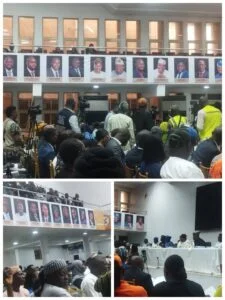Obasa, represented by member Stephen Ogundipe, said any agent collecting more than five per cent commits an offence punishable by refund, two years’ imprisonment, or a fine of ₦1 million.
He said landlords’ and estate agents’ activities regarding service charges had become worrisome and a cause for concern.
The bill, he noted, will provide a framework for tenancy agreements, rent payment, property maintenance, and the process for recovery of premises.
According to him, the bill allows agitations and opinions to be incorporated to produce vibrant legislation capable of standing the test of time.
Obasa revealed Lagos’ housing deficit had risen by 15 per cent, from 2.95 million units in 2016 to 3.4 million units in 2025.
He explained that over 70 per cent of Lagos residents are renters, with many spending 40 to 60 per cent of their income on rent.
Chairman of the House Committee on Housing, Olusegun Ege, said the hearing allowed stakeholders and the public to give inputs on the proposed law.
Ege described stakeholder consultation as an essential legislative process that could promote progressive governance.
He said the bill has four parts, 45 clauses, and addresses rights, obligations, tenancy agreements, rent payments, and dispute resolution procedures.
According to him, the bill outlines clear eviction procedures to protect tenants from arbitrary evictions, important for stability, especially for families and small businesses.
It encourages mediation as the first dispute resolution step, saving both parties time and money compared to prolonged court proceedings.
The bill also seeks to curb unreasonable rent increases, simplify processes, and shorten litigation periods in illegal eviction cases.
Provisions include virtual hearings, weekend and public holiday proceedings, and electronic filing to fast-track justice delivery.
State Commissioner for Housing, Moruf Akinderu-Fatai, stressed the bill’s role in boosting investment confidence.
State Commissioner for Justice, Lawal Pedro, highlighted its potential to resolve tenancy cases within six months.
Pedro said this would prevent defaulting tenants or landlords from misusing court processes.
Professional bodies, however, raised concerns over the five per cent agency fee limit, saying it conflicts with established professional charges.
Representatives of the Estate Surveyors and Valuers Registration Board of Nigeria urged a review to align the bill with existing regulations.
Stakeholders discussed the bill’s social impact, the need for dedicated tenancy courts, and possible state-led housing projects to reduce market pressure.
NAN reports that the hearing attracted government officials, legal practitioners, estate surveyors, civil society groups, and community representatives, reflecting the bill’s wide-ranging economic and social impact.



